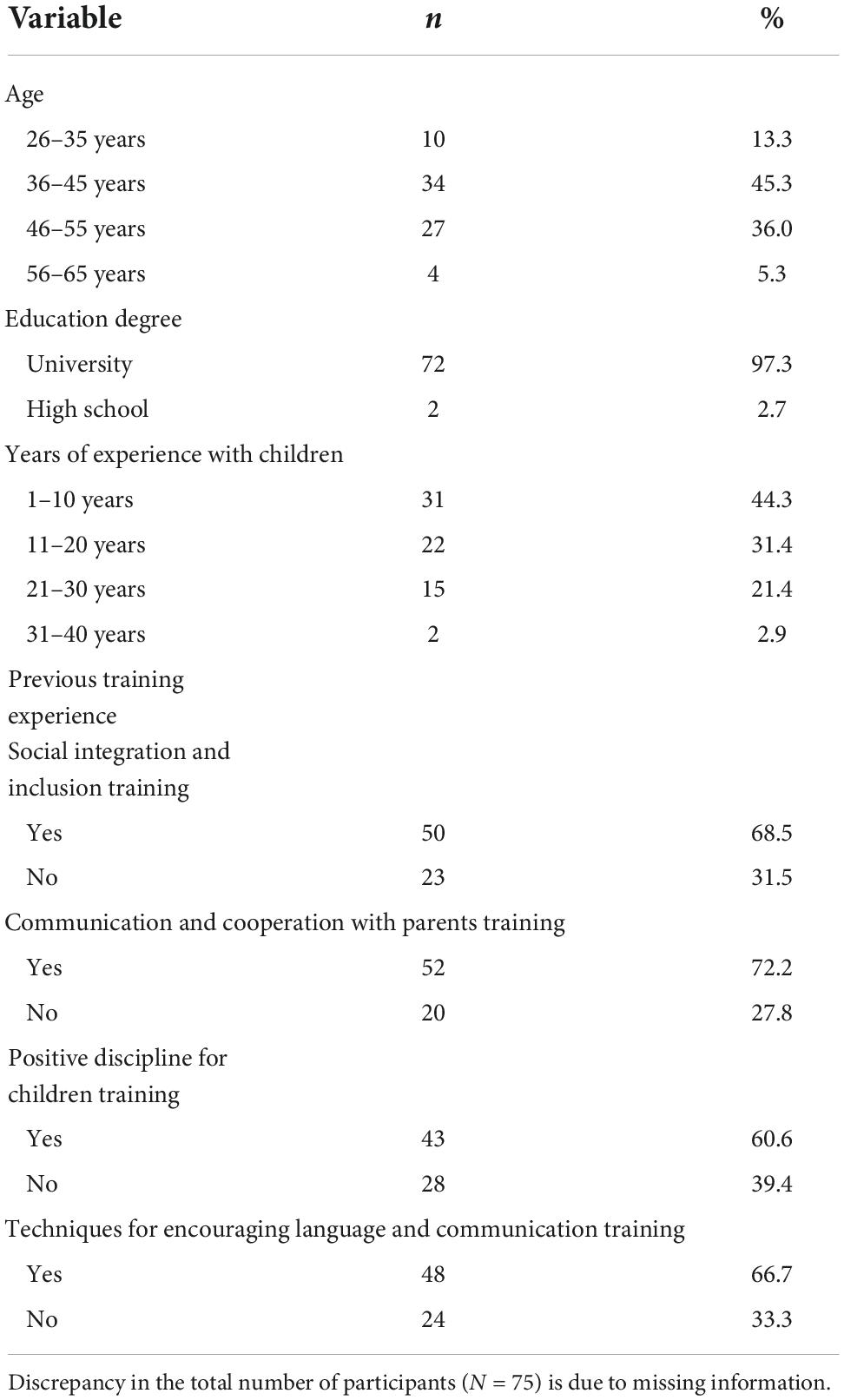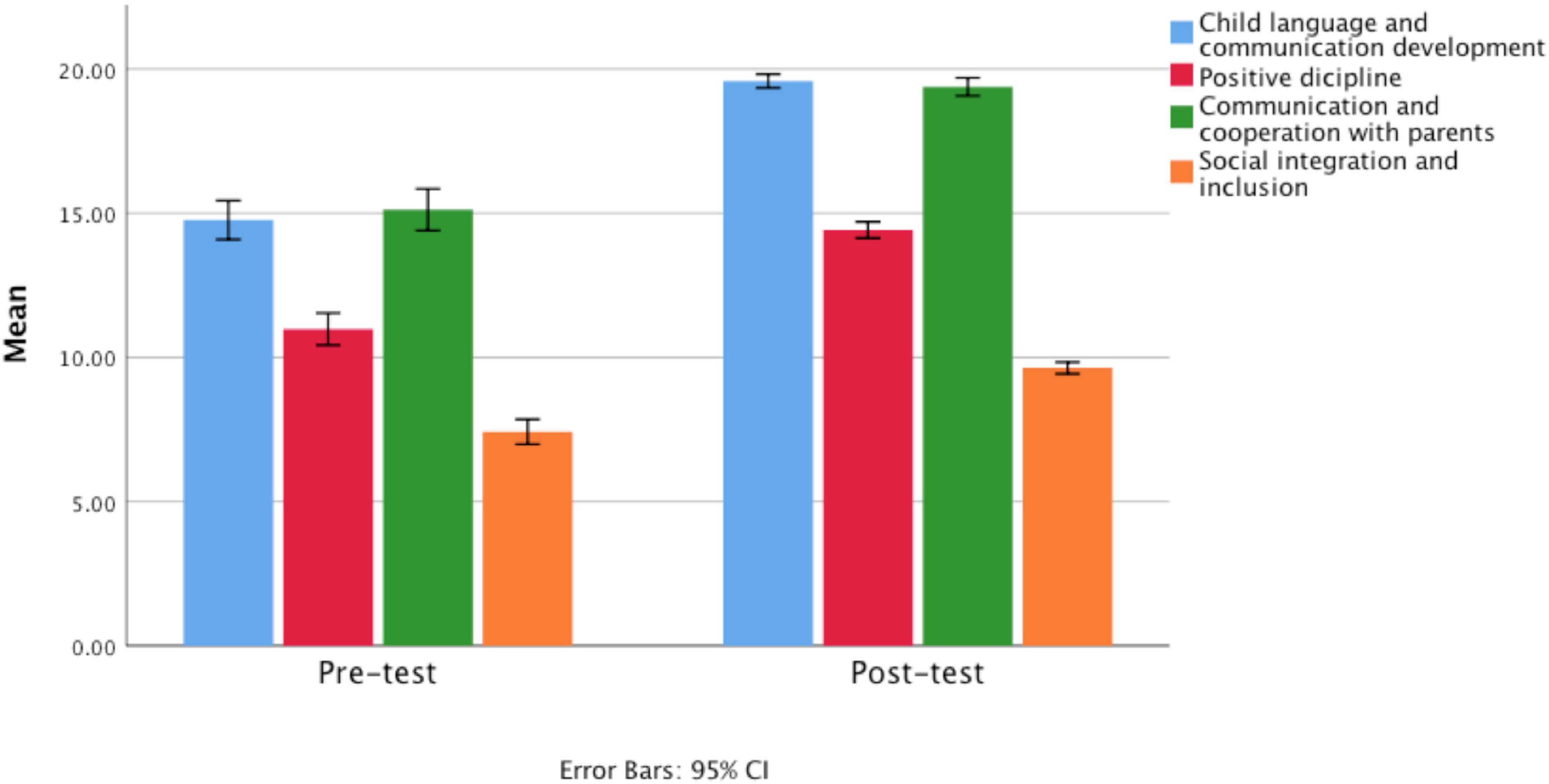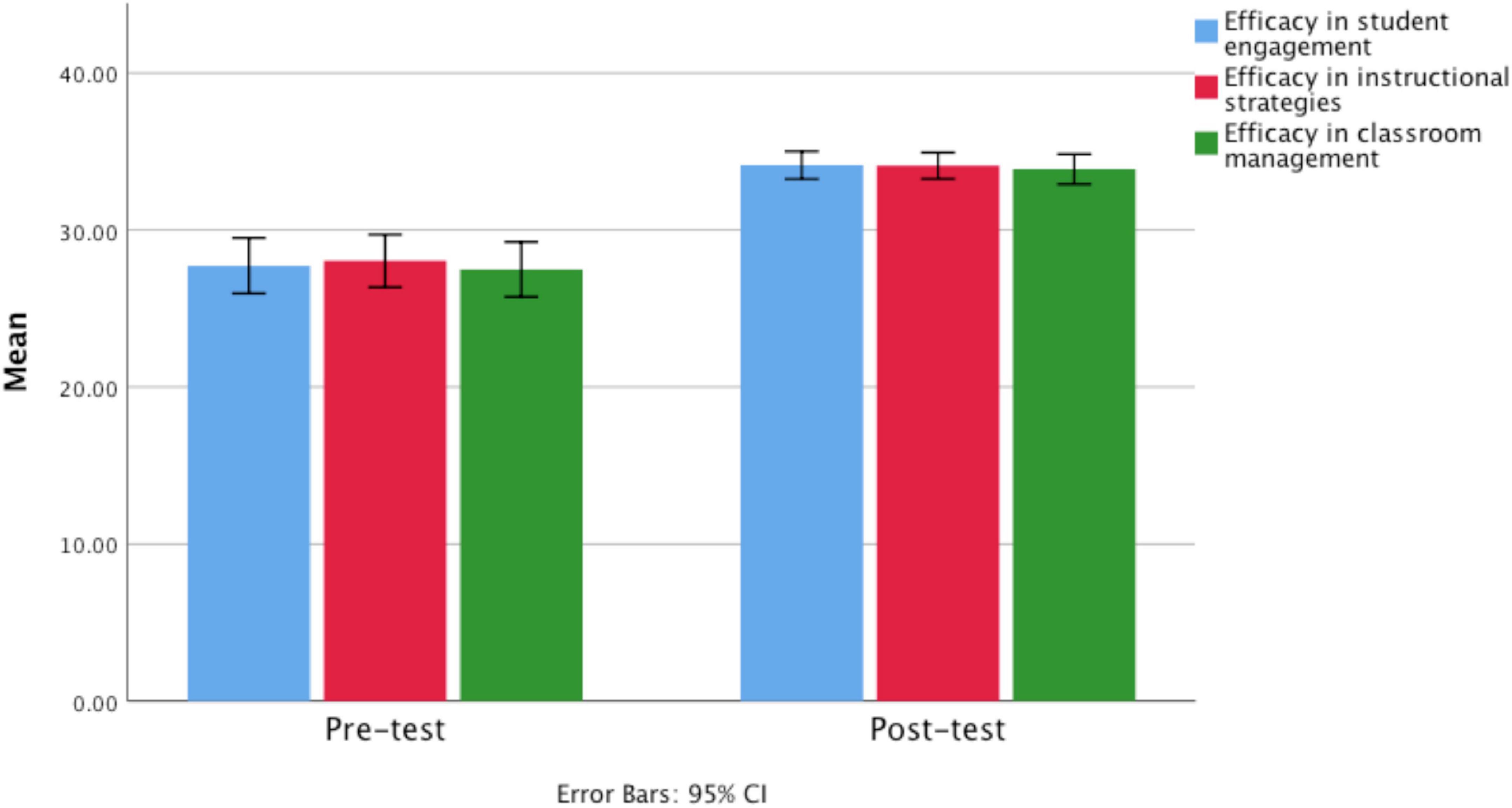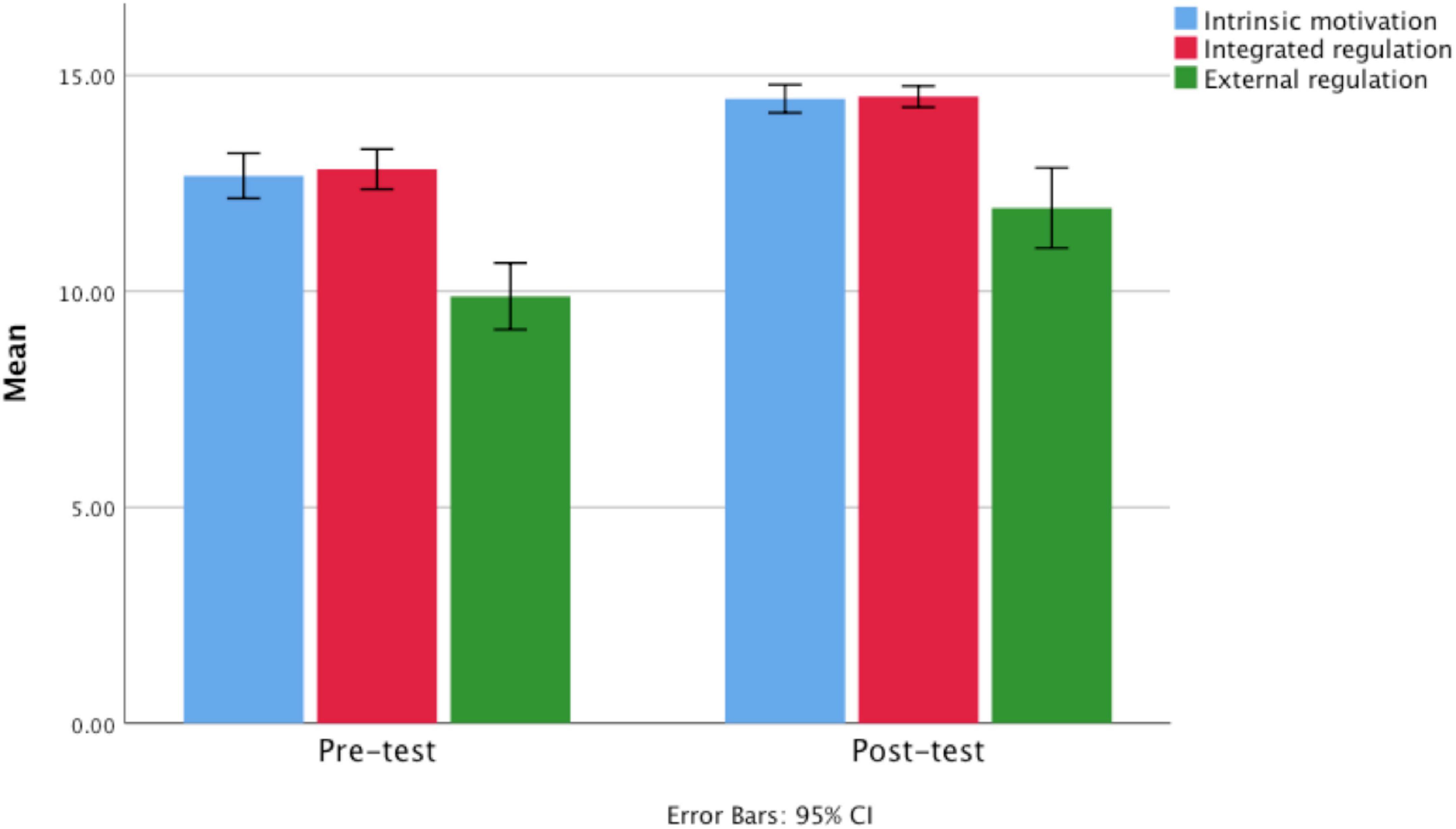- 1Department of Psychology, Faculty of Philosophy, University of Prishtina ‘Hasan Prishtina’, Prishtina, Kosovo
- 2Help the Life Association, Tirana, Albania
This study aimed to evaluate the impact of a training program for professional development on early education teachers’ knowledge and skills, work motivation, and self-efficacy. A one-group pre–post-test design was used to assess the effect of the training program on 75 teachers working in public early education institutions in the Tirana municipality in Albania. The results indicated that completing training was associated with a significant increase in early education teachers’ knowledge and skills, work motivation, and self-efficacy. These findings demonstrate the multiple benefits of professional training as a mechanism for supporting teachers’ personal and professional development and improving teaching practice, the quality of early education settings, and children’s early learning and growth experiences. Implications for practice, study limitations, and future research directions are also discussed.
Introduction
The role of early education teachers is considered critical in children’s development and learning; their academic qualifications, knowledge of educational topics, competencies, and skills are indispensable to the educational process and quality (Rahman et al., 2011). However, to contribute to education quality, teachers must be prepared to work at the highest standards (Darling-Hammond, 2000). Therefore, new teaching concepts, knowledge, and skills must be continuously developed for effective teaching practices and professional growth (Fleming and Kleinhenz, 2007).
Research has demonstrated that early education teachers’ qualifications and level of professional development affect children’s development and learning (Pianta and Hamre, 2009) and are critical for supporting social inclusion and integration of all children from diverse groups into educational settings (Sylva et al., 2004; Burger, 2010). Professional development of teachers is considered a primary method of enhancing the quality of early childhood education (Jensen et al., 2017; Méndez et al., 2017). Thus, the growing need for the advancement of early education teachers’ pedagogical skills and knowledge has led to an increase in training opportunities worldwide (Peña-López, 2009).
In addition to contributing to their professional development, early education teachers’ participation in professional training influences their work motivation (Bennell and Ntagaramba, 2008), enhances their pedagogical skills, and aids personal development and cultural enrichment (Sheridan et al., 2009). Further, early education teachers who engage in professional development activities exhibit increased self-efficacy (Ingvarson et al., 2005). Improvement in self-efficacy has also been suggested to contribute to teachers’ effectiveness, commitment, and enthusiasm (Tschannen-Moran and Hoy, 2001) and to influence teachers’ ability to effectively use classroom resources, maintain discipline, and support parents in joint efforts for their children’s education (Friedman and Kass, 2002). In contrast, low self-efficacy and lack of professional development have been associated with fatigue and low work motivation among early education teachers (Jhurree, 2005).
Although early education teachers are tasked with encouraging children’s healthy and successful development, the family also plays a vital role in children’s outcomes. Therefore, their cooperation with educational institutions and teachers is essential (Britto et al., 2013). Research evidence shows that proper communication and cooperation with children’s family members are critical for motivating early education teachers at work (Patrick et al., 2000) and influencing teachers’ self-perceptions (Kloep and Tarifa, 1994), and are a strong predictor of teachers’ self-efficacy (Chung et al., 2005).
Teachers’ knowledge and ability to implement positive discipline are also important factors for effective classroom management and encouragement of healthy and appropriate child development. Improved knowledge and the use of positive discipline within the classroom have been shown to contribute to early education teachers’ motivation, increased tolerance, and enhanced classroom management skills (Kaplan et al., 2002). In contrast, lack of professional development, inadequate knowledge and skills regarding behavior management, and lack of positive discipline for children have been associated with decreased motivation and an increased likelihood of leaving the field of education (Rice et al., 2011).
Another essential aspect of early education teachers’ work is the application of teaching practices that support overall child development and facilitate proper language development. However, teachers’ level of professional development, which affects their motivation for work, is also suggested to influence the quality and appropriateness of educational practices to support child development. Children in classrooms where early education teachers received professional training in language development have been found to have higher language proficiency scores than children in classes where teachers did not receive such training (Davidson et al., 2015). Furthermore, teachers’ increased self-efficacy is associated with higher-quality educational environments. In comparison to teachers with low self-efficacy, early education teachers with enhanced self-efficacy have a more positive impact on children’s language development through the improved quality of their interactions with children (Guo et al., 2012).
A further indicator of early education quality is the level of inclusive practices that offer access to learning opportunities and appropriate support based on the individual educational needs of all beneficiaries, regardless of their background and diversity (Barton and Smith, 2015). However, an important element in implementing inclusive education is early education teachers’ knowledge of suitable inclusive practices, work motivation, and self-efficacy. Existing evidence shows that early education teachers with professional development in inclusive practices use more effective educational strategies and have greater job satisfaction and motivation compared to those who lack professional development in inclusive education (Brownell and Pajares, 1999). Several studies have also shown that attending inclusiveness training positively influences early education teachers’ attitudes toward diversity and their self-efficacy (Lancaster and Bain, 2010), thus supporting teachers’ efficiency at successfully creating an inclusive educational environment (Lohrmann and Bambara, 2006).
The early education system in the Republic of Albania is organized through both public and private institutions (Pre-university education system in the Republic of Albania Law of 2012, 2012, Pub. L. No. 69/2012). Children aged 3-6 years are educated in kindergarten and preparatory classes. Children in kindergartens are grouped into classrooms by age (i.e., 3–4, 4–5, and 5-6 years old). Preparatory classes operate in elementary schools, and children can attend these at the age of 5. The child-teacher ratio in public kindergartens is 18:1 and 22:1 (Albanian Ministry of Education and Sports, 2014a). The majority of children aged 3-6 years attend public early education institutions, whereas only 6% attend private institutions. The enrolment rate for early education is reported to be around 81% (UIS, 2020); however, the enrolment and inclusion of children with disabilities in early education institutions is reported to be very low and a concern in Albania (UNESCO, 2017; Duraku et al., 2021).
According to the Albanian Ministry of Education and Sports, policies regarding the professional requirements of early education teachers include teachers’ educational preparation, continuing professional development, and necessary qualifications. Educational institutions plan their professional development according to the needs of teachers and in compliance with central, local, and institutional educational policies (Albanian Ministry of Education and Science, 2013).
Albanian legislation and guidelines emphasize the importance of professional development programs for educators as well. Administrative instruction documents also specify procedures for the professional development of the educational staff. These programs aim to expand teachers’ knowledge and increase their competencies, thereby improving the quality of educational services (Albanian Ministry of Education and Sports, 2014a). Early education teachers and school principals are required to participate in professional development for at least 3 days annually because highly qualified and motivated teachers are essential for the delivery of quality education (Albanian Ministry of Education and Sports, 2014b).
The Institute of Education Development (IED) provides the most training; however, other providers can also offer training programs subject to accreditation by the Training Programme Accreditation Committee. Teachers and executives can choose training modules offered by accredited training providers and programs (UNICEF, 2019a). However, the quality and impact of these training programs remain unclear (UNICEF, 2019b). Moreover, although positive achievements have been made regarding the legal documentation of early education teachers’ status, research evidence suggests that less progress has been noted on developing strategies for professional development (Haxhiymeri and Mita, 2014). Even though, according to the normative previsions professional development programs are planned in line with the needs of teachers (Albanian Ministry of Education and Science, 2013), existing research data suggest that national training providers lack mechanism to assess teachers’ needs for professional development (Stanley, 2021). Hence, the lack of relevance of the training offered prevents teachers from participating in or benefiting from training programs, hindering professional development based on their needs (Stanley, 2021).
Therefore, this study aimed to evaluate the impact of early education teachers’ training on the advancement of their knowledge and skills, work motivation, and self-efficacy. The training modules used in this study were designed to enhance early education teachers’ knowledge and skills for supporting child language and communication development, cooperation with parents, classroom management practices, and inclusion. These topics were chosen based on teachers’ needs in the training needs assessment, conducted as a part of the “Early Intervention, the Best Approach to Advance Child Development” project implemented by the Help the Life Association in Tirana, Albania. Despite the training topics being relevant to the needs of participants for their professional development, the lack of knowledge on the above issues represents some of the obstacles early education staff faces in improving early education quality and inclusive practices in early education institutions in Albania (Duraku et al., 2021).
Therefore, the current results can serve as baseline evidence informing education policymakers and other stakeholders of the importance of evaluating the effectiveness of training programs and designing professional programs tailored to the needs of the beneficiaries. Furthermore, our results may be especially relevant for promoting teachers’ professional development, which can support the improvement of policies and practices based on evidence.
Materials and methods
Sample and procedure
This study consisted of a one-group pre-post-test design that aimed to measure the effects of an intervention on a specific sample. This design is considered relevant for examining whether expected changes have occurred in the participants of a program. Typically used for evaluating small size groups, a one-group pre-post-test design is considered a pre-experimental research design, relevant for researchers who want to know the outcome of interest among all participants of a training program without having a control group and who want to determine the possible results of a true future experiment (Reichardt, 2019).
A total of 75 early education teachers from public early education institutions in the Tirana municipality in Albania participated in the training and were a part of the research. This study was conducted as a part of the Help the Life Association project, “Early Intervention, the Best Approach to Advance Child Development.” Participants were recruited with support and prior approval from the Center of Economic Development and Education of Children. Participants were informed of the voluntary nature of their participation in this research, the confidentiality of their responses, and their ability to revoke their participation at any time.
Data collection began in September 2019. After completing the pretest questionnaires, participants were provided training. Following the training, participants completed the post-test survey. The procedure was the same for each training session for all assigned modules. The questionnaire took approximately 10 min to complete.
Participants
Overall, 75 teachers participated. Table 1 presents participants’ demographic and professional characteristics. The majority of the participants (n = 34, 45.3%) were aged between 36 and 45 at the time of the survey, almost all of them had a university degree (n = 72, 97.3%), and more than half of them had more than a decade of experience working with children (n = 39, 57.7%). Furthermore, more than 60% of the participants reported that they had previously received training (60.6–72.2% responding yes to each type of training).
Measures
Validated questionnaires were used to measure the respective variables at baseline (pretest) and after (post-test) the training was completed.
The self-perception of knowledge and skills questionnaire
This scale was used to measure participants’ perception of their knowledge and skills regarding the topics covered in the training program. The questionnaire consisted of 14 items divided into four subscales. Participants were asked to rate each statement on a 5-point Likert scale (1 = not at all to 5 = a lot). The child language and communication development subscale (4 items) asked participants to evaluate their knowledge and ability to support child language and communication development. The positive discipline subscale (3 items) assessed participants’ knowledge of the advantages of positive discipline and the disadvantages of punitive discipline, including their ability to use positive discipline strategies as a part of their classroom management techniques. The cooperation and communication with parents subscale (4 items) asked teachers to self-evaluate their knowledge and skills for cooperation and communication with children’s parents, beneficiaries of the early education institutions where the teachers work. The social integration and inclusion subscale (2 items) asked teachers to self-evaluate their knowledge regarding the role of inclusion and social integration for the benefit of all children’s development, and their ability to support inclusion and provide equal opportunities for all children, including those from diverse groups. The internal consistency of the overall scale was very good for both the pretest (α = 0.93) and post-test (α = 0.90).
External and intrinsic motivation for work—WEIMS
The WEIMS subscales (Tremblay et al., 2009) were used to assess the types of work motivation. Each subscale consisted of three items asking participants to indicate the reasons they were involved in their current job: intrinsic motivation (e.g., learning new things, achieving success, or experiencing interesting challenges), integrated regulation (e.g., work is a fundamental part of who I am), and external regulation (e.g., for the income it provides me). All items were rated on a 5-point Likert scale (1 = does not correspond to 5 = corresponds exactly). This measure has been validated and previously used in the Albanian context and the internal consistency of the overall scale was in good range (α = 0.86), (Duraku et al., 2022).
The Teachers’ Sense of Efficacy Scale
The Teachers’ Sense of Efficacy Scale (short version; Tschannen-Moran and Hoy, 2001) was used to assess participants’ self-efficacy with regard to their work in early educational institutions. This scale consisted of 12 questions divided into three subscales, each measuring a specific aspect of teachers’ daily work activities: efficacy for student engagement (e.g., How much can you do to motivate students who show low interest in schoolwork?); efficacy of instructional strategies (e.g., How well can you implement alternative strategies in your classroom?); and efficacy in classroom Management (e.g., How much can you get children to follow classroom rules?). The questions were rated on a 9-point Likert scale (1 = not at all to 9 = quite a lot). The internal consistency of the overall scale for both the pretest (α = 0.98) and post-test (α = 0.97) was good.
Demographic questionnaire
Questions regarding participants’ age, level of education, number of years in the education system, and experience with previous training on the topics covered in the training modules were included in the demographic questionnaire.
Analysis
Before the primary analyses, preliminary analyses were conducted to test the assumptions of parametric testing. Frequencies (percentages) and means (standard deviations) were calculated for categorical and scale variables, respectively. To examine differences between the pre- and post-tests, paired-sample t-tests were used. A general linear model was used to compare the mean values of pretest and post-test differences across the (independent variables) demographics and previous training experience. All analyses were conducted using IBM SPSS Statistics v.22 (Armonk, NY, IBM Corp), the most widely used software for analyzing quantitative scientific data in social science research (Gogoi, 2020).
Results
On completion of the training, there was an improvement in teachers’ knowledge and skills for the selected topics. Pre-post-test results showed a significantly increased mean value for each subscale of the knowledge and skills scale: child language and communication development (pretest: M = 15.01, SD = 2.27; post-test: M = 19.56, SD = 0.91, p < 0.001), positive discipline (pretest: M = 11.07, SD = 1.89; post-test: M = 14.36, SD = 1.12, p < 0.001), cooperation and communication with parents (pretest: M = 14.93, SD = 2.51; post-test: M = 19.32, SD = 1.22, p < 0.001), and social integration and inclusion (pretest: M = 7.34, SD = 1.57; post-test: M = 9.59, SD = 0.82, p < 0.001). Although all of the abovementioned differences were significant, the highest impact of the training (largest mean pre-post-test difference = 4.55) was observed with regard to child language and communication development, whereas the lowest impact (smallest mean pre-post-test difference = 2.25) was observed with regard to the social integration and inclusion subscale (Figure 1).
Furthermore, the results showed that the training contributed to the enhancement of teachers’ self-efficacy for student engagement (pretest: M = 26.97, SD = 6.46; post-test: M = 33.91, SD = 3.45, p < 0.001), instructional strategies (pretest: M = 27.68, SD = 6.14; post-test: M = 34.04, SD = 3.14, p < 0.001), and classroom management (pretest: M = 27.59, SD = 6.31; post-test: M = 33.87, SD = 3.67, p < 0.001; Figure 2). The increase in all scores was significant. The highest impact of the training (largest pre-/post-test difference = 6.94) was observed with regard to teachers’ self-efficacy for student engagement (Figure 2).
The training program also contributed to significantly increasing teachers’ work motivation. The results showed a significant increase in intrinsic motivation (pretest: M = 12.58, SD = 1.88; post-test: M = 14.42, SD = 1.19, p < 0.001), integrated regulation (pretest: M = 12.83, SD = 1.72; post-test: M = 14.55, SD = 0.88, p < 0.001), and external regulation subscale (pretest: M = 10.07, SD = 2.56; post-test: M = 12.08, SD = 3.45, p < 0.001; Figure 3). The highest impact of the training (largest mean pre-/post-test difference = 2.01) was found with regard to teachers’ external regulation (Figure 3).
When comparing the impact of the training on the three main measures (knowledge and skills—pretest: M = 48.28, SD = 7.74 and post-test M = 63.02, SD = 3.53, p < 0.001; self-efficacy—pretest: M = 83.25, SD = 18.71 and post-test: M = 102.09, SD = 10.19, p < 0.001; motivation for work—pretest: M = 35.38, SD = 4.70 and post-test: M = 40.89, SD = 4.86, p < 0.001), the training was the most effective at improving teachers’ self-efficacy (mean pre-/post-test difference = 18.84), followed by knowledge and skills (mean pre-/post-test difference = 14.74) and motivation for work (mean pre-/post-test difference = 5.51; Figure 4).

Figure 4. The effect of training on knowledge and skills, self-efficacy, and motivation for work measures.
The results showed no significant differences in the mean overall knowledge and skills score by the independent variables in the general linear model (p > 0.05), suggesting that the impact of training on participants’ overall knowledge and skills on the selected topics was not significant with demographics and previous training experience (Table 2).
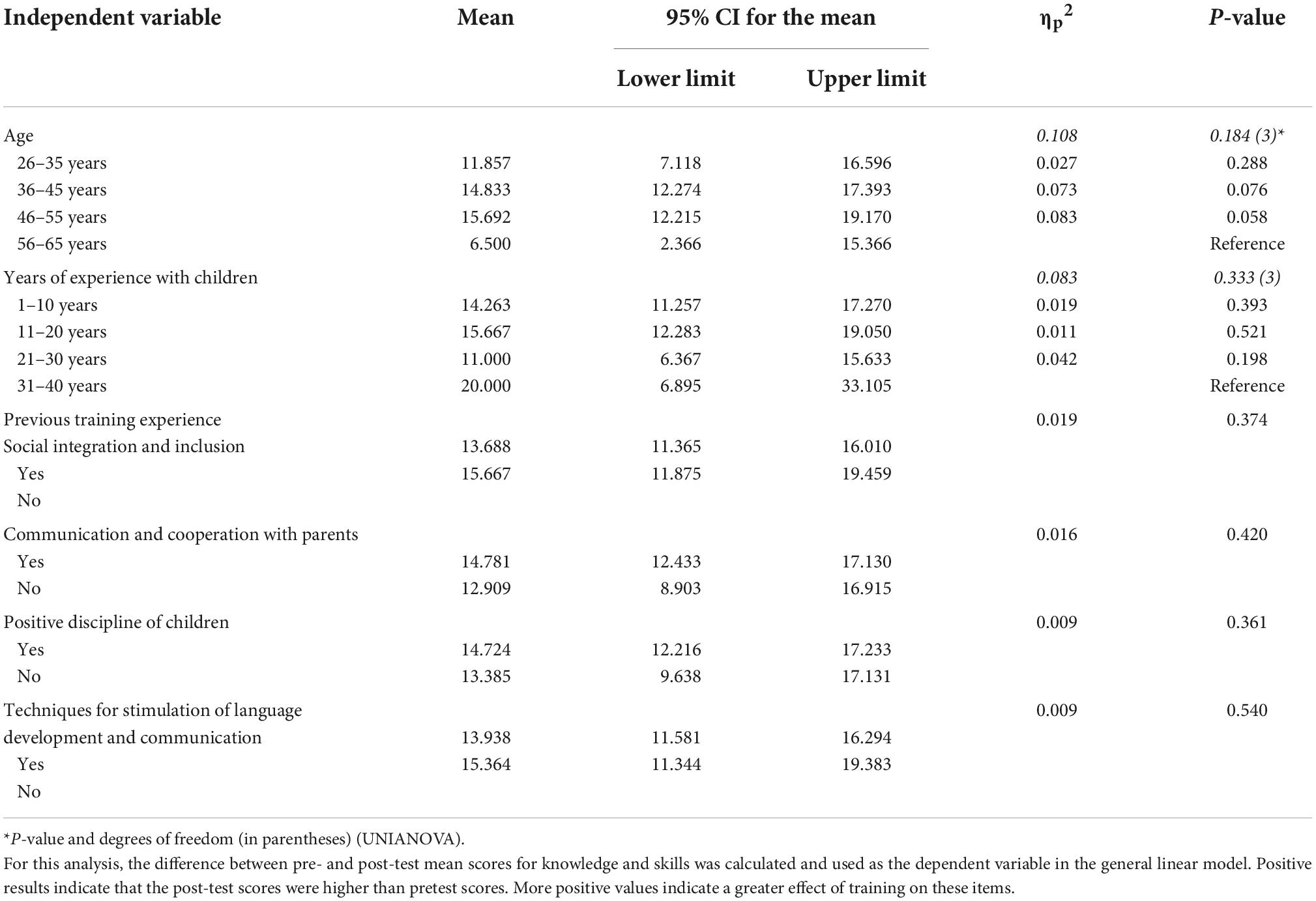
Table 2. The impact of training on overall knowledge and skills scores: Mean values of pre-post-test differences in the general linear model.
Next, there were no significant differences in the mean overall self-efficacy score by the independent variables in the general linear model (p > 0.05 in all instances), except for previous training experience in “communication and cooperation with parents.” Participants without such experience benefited more from the training than those who had previously trained in this area (p = 0.049). Nevertheless, the overall impact of training on participants’ self-efficacy regarding the selected topics did not vary significantly across the independent variables (Table 3).
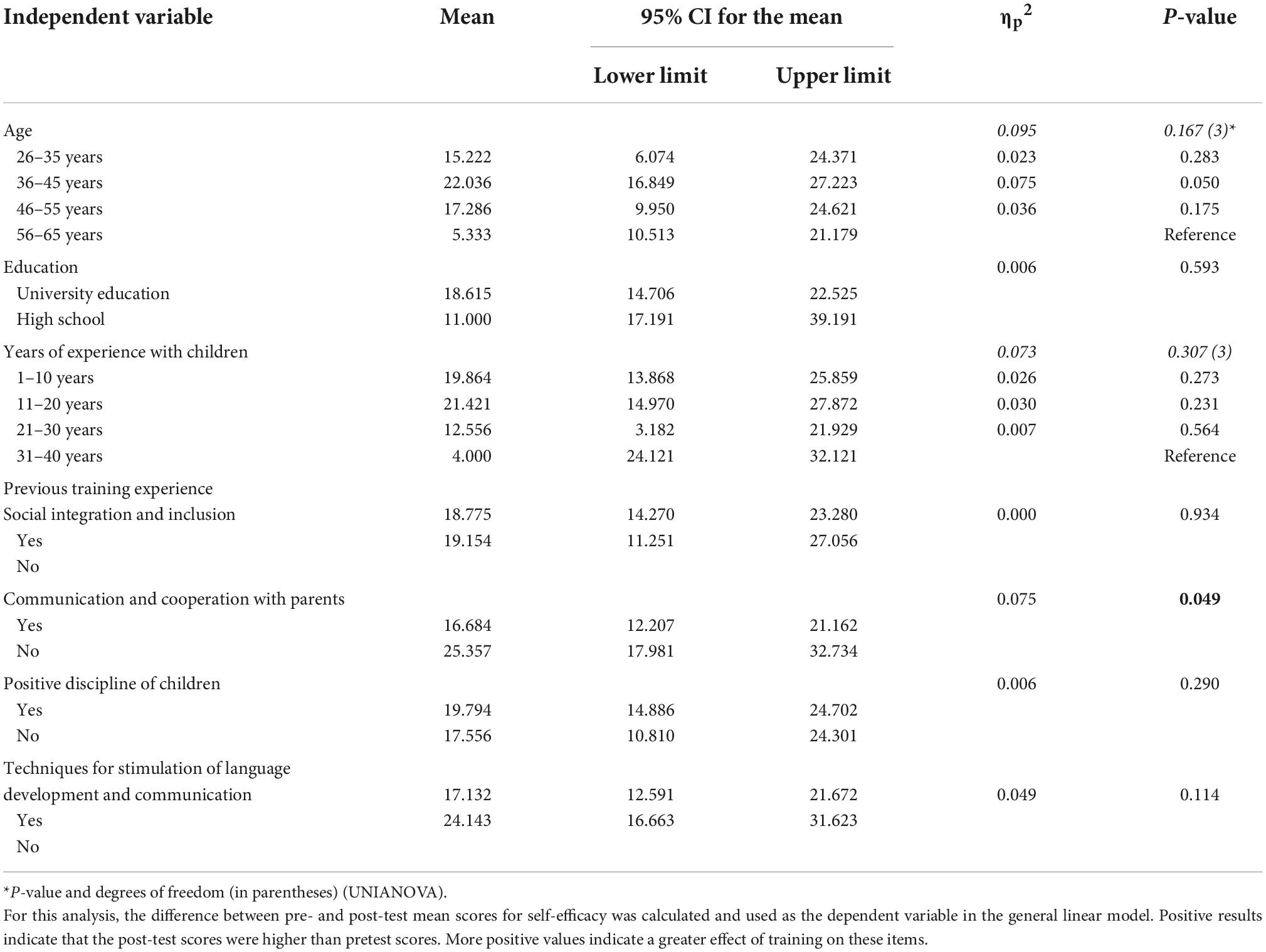
Table 3. The impact of training sessions on overall self-efficacy scores: Mean values of pre-post-test differences in the general linear model.
Last, there was no significant enhancement in motivation for work scores across the independent variables (demographics and previous training experience) in the general linear model (p > 0.05, in all instances; Table 4).
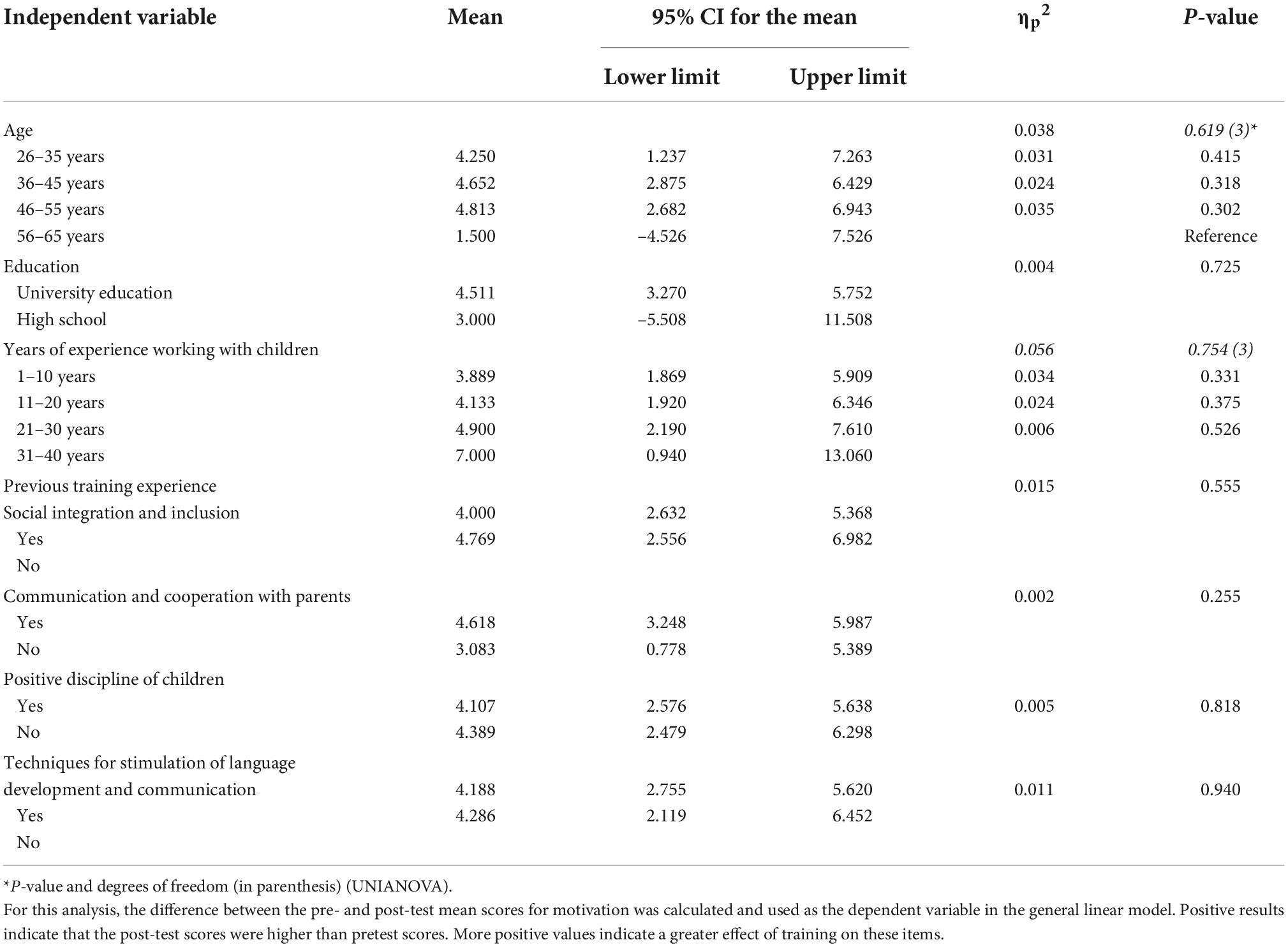
Table 4. The impact of training on overall motivation for work scores: Mean values of pre-post-test differences in the general linear model.
Discussion
The present study provides empirical evidence that professional training enhances early education teachers’ knowledge and skills, work motivation, and self-efficacy, consistent with previous findings (Avidav, 2000; Sheridan et al., 2009; Barnett, 2016).
Furthermore, our results showed a significant impact of the training program on different aspects of participants’ work (e.g., enhancing knowledge and skills for parental cooperation, child language and communication development, positive discipline, and efficacy for student engagement). These findings, in addition to their relevance to previous research (Bowman et al., 2001; Ackerman, 2005; Kwon et al., 2011; Rice et al., 2011), also confirm the importance of offering professional development opportunities that are tailored to the needs of participants/teachers. Therefore, these findings can inform national training agencies—especially in countries such as Albania, which lack mechanisms to assess teachers’ needs for their professional development (Stanley, 2021)—of the importance of assessing and developing programs tailored to the identified needs to improve the benefits of these programs.
Furthermore, based on the multi-efficacy of the training program, as the current results suggested, professional development can be considered a key mechanism for enhancing the quality of early education and teachers’ work. Therefore, these findings can also serve as baseline evidence for policymakers and national training providers to enhance professional opportunities while working toward improving education quality. This might be especially relevant for countries such as Albania, which lack strategies and specific objectives for enhancing professional development, qualified teachers, and appropriate professional training opportunities (Stanley, 2021).
Additionally, these findings provide support for early education teachers, in both Albania and other low- and middle-income countries, to advocate for the urgent need for adequate professional development opportunities as a means of improving the quality of their work. Evidence suggests that within these countries, apart from the lack of adequate opportunities for professional development in their jobs, teachers also lack pedagogical skills before entering their jobs (Stanley, 2021). Thus, enhancement of professional development opportunities for teachers as part of their job and prior to them entering the workforce, as a part of their teacher education, should be promoted and implemented.
Moreover, the current study’s findings showed that the training achieved significant improvement in teachers’ knowledge and skills in different areas, including social integration and inclusion. However, the results also showed that the level of teachers’ perceived knowledge and skills for social integration and inclusion prior to training and after training was the lowest in comparison with other training topics regarding knowledge and skills (e.g., parental cooperation). Therefore, even though this difference may be subject to training-related factors, the low level of perceived knowledge and skills prior to attending the training suggests the need to enhance professional development opportunities for teachers in Albania and equip them with relevant inclusive knowledge and skills. This knowledge will enable them to improve their practice, thus accommodating the needs of children from diverse groups, especially children with disabilities, whose integration into the early education system in Albania remains a challenge (UNESCO, 2017). Furthermore, if these findings are discussed within the context of Albania, the lack of teachers’ knowledge regarding social integration and inclusion also represents an obstacle for education staff in supporting inclusion of children with disabilities in early education settings in Albania, as previous findings have suggested (Duraku et al., 2021). Therefore, this evidence can also inform policymakers and educational institutions on further assessment of factors that might affect teachers’ level of knowledge and skills regarding inclusion, such as their attitudes toward enhancing their knowledge on topics related to inclusion.
Conclusion
The current study suggests that continuing professional development is a key component in improving and ensuring the quality of education institutions, enhancing teachers’ work performance, and offering better early learning experiences for children’s growth and development. Participation in professional development opportunities, tailored to their needs, can contribute to teachers’ work motivation and self-efficacy, thus affecting their practice, pedagogical approaches, and classroom management skills regarding offering equal and appropriate opportunities for all children. Creating mechanisms for assessing teachers’ needs and measuring the quality and impact of professional development can support educational institutions to develop proper support for teachers, encourage teachers’ participation, and have a sustainable positive impact on all beneficiaries of early education institutions.
Limitations and directions for future research
The current findings should be considered in the light of certain limitations. Even though the results were discussed in connection with previously published research in other contexts, the current study used a single-group design, which prevents a more valuable connection between professional training and the outcomes assessed. Therefore, these findings can be considered preliminary data, useful for determining the possible results of future research evaluating the effectiveness of similar training programs. Moreover, if future studies use quasi-experimental designs to assess training program effectiveness, they should include control or comparison groups (Reichardt, 2019). Future research should also follow the outcomes of the training through a longitudinal design and evaluate its effectiveness in the workplace by observing its impact among early education beneficiaries.
Data availability statement
The datasets generated and/or analyzed in this study are available from the corresponding author upon reasonable request.
Ethics statement
This research study survey was conducted with a prior approval from the Center of Economic Development and Education of Children. Informed consent was obtained from all participants in this study.
Author contributions
ZHD developed the research idea and contributed to all parts of the manuscript development and finalization. Each of the other contributing authors has been involved in data gathering, analysis, literature review, and manuscript development from the initial phases to the finalization of the manuscript. All authors contributed to the article and approved the submitted version.
Acknowledgments
This research was conducted as a part of the Help the Life Association project “Early Intervention, the Best Approach to Advance Child Development,” supported by a grant from the Civil Society Programme for Albania and Kosovo, financed by the Norwegian Ministry of Foreign Affairs, and managed by Kosovar Civil Society Foundation in partnership with Partners Albania for Change and Development (PA). The content and recommendations do not represent the official position of the Norwegian Ministry of Foreign Affairs and PA.
Conflict of interest
The authors declare that the research was conducted in the absence of any commercial or financial relationships that could be construed as a potential conflict of interest.
Publisher’s note
All claims expressed in this article are solely those of the authors and do not necessarily represent those of their affiliated organizations, or those of the publisher, the editors and the reviewers. Any product that may be evaluated in this article, or claim that may be made by its manufacturer, is not guaranteed or endorsed by the publisher.
References
Ackerman, D. J. (2005). Getting teachers from here to there: Examining issues related to an early care and education teacher policy. Early Child. Res. Pract. 7:n1.
Albanian Ministry of Education and Science (2013). On the approval of normative provisions for the pre-university education system. Tirana: Albanian Ministry of Education and Science.
Albanian Ministry of Education and Sports (2014a). Pre-education system reform. Working group report. Tirana: Albanian Ministry of Education and Sport.
Albanian Ministry of Education and Sports (2014b). Guidelines for professional development of educational employees. Tirana: Albanian Ministry of Education and Sport.
Avidav, A. (2000). Professional career empowerment amongst teachers in primary school: The concept and its components. Doctoral dissertation. Jerusalem: Hebrew University.
Barnett, W. S. (2016). Better teachers, better preschool: Student achievement linked to teacher qualifications. New Brunswick, NJ: National Institute for Early Education Research.
Barton, E. E., and Smith, B. J. (2015). Advancing high-quality preschool inclusion: A discussion and recommendations for the field. Top. Early Child. Spec. Educ. 35, 69–78. doi: 10.1177/0271121415583048
Bennell, P., and Ntagaramba, J. (2008). Teacher motivation and incentives in Rwanda: A situational analysis and recommended priority actions. Kigali: MINEDUC.
Bowman, B. T., Donovan, M. S., and Burns, M. S. (2001). Eager to learn: Educating our preschoolers. Washington, DC: National Academy Press.
Britto, P. R., Engle, P. L., and Super, C. M. (2013). Handbook of early childhood development research and its impact on global policy. Oxford: Oxford University Press. doi: 10.1093/acprof:oso/9780199922994.001.0001
Brownell, M. T., and Pajares, F. (1999). Teacher efficacy and perceived success in mainstreaming students with learning and behavior problems. Teach. Educ. Spec. Educ. 22, 154–164. doi: 10.1177/088840649902200303
Burger, K. (2010). How does early childhood care and education affect cognitive development? An international review of the effects of early interventions for children from different social backgrounds. Early Child. Res. Q. 25, 140–165. doi: 10.1016/j.ecresq.2009.11.001
Chung, L. C., Marvin, C. A., and Churchill, S. L. (2005). Teacher factors associated with preschool teacher–child relationships: Teaching efficacy and parent–teacher relationships. J. Early Child. Teach. Educ. 25, 131–142. doi: 10.1080/1090102050250206
Darling-Hammond, L. (2000). Teacher quality and student achievement. Educ. Policy Anal. Arch. 8:1. doi: 10.1177/003172170508700318
Davidson, C. A., Walters, J. N., and Elizabeth, H. W. (2015). Leaping the language gap: Strategies for preschool and head start teachers. Int. J. Child Care Educ. Policy 9, 1–17. doi: 10.1186/s40723-015-0009-8
Duraku, Z. H., Jahiu, G., Likaj Shllaku, E., Boci, L., and Shtylla, H. (2021). Albanian preschool personnel’s perceived obstacles to implementing effective inclusive education. Front. Educ. 6:645254. doi: 10.3389/feduc.2021.645254
Duraku, Z. H, Jahiu, G., and Geci, D. (2022). The interplay of individual and organizational factors with early childhood teachers’ level of work motivation, job satisfaction, and burnout. Int. J. Educ. Reform 31, 1–16. doi: 10.1177/10567879221114891
Fleming, J., and Kleinhenz, E. (2007). Towards a moving school: Developing a professional learning and performance culture. Camberwell, VIC: ACER Press.
Friedman, I. A., and Kass, E. (2002). Teacher self-efficacy: A classroom-organization conceptualization. Teach. Teach. Educ. 18, 675–686. doi: 10.1016/S0742-051X(02)00027-6
Gogoi, P. (2020). Application of SPSS programme in the field of social science research. Int. J. Recent Technol. Eng. 8, 2424–2427. doi: 10.35940/ijrte.D9260.018520
Guo, Y., Connor, C. M., Yang, Y., Roehrig, A. D., and Morrison, F. J. (2012). The effects of teacher qualification, teacher self-efficacy, and classroom practices on fifth graders’ literacy outcomes. Elem. Sch. J. 113, 3–24. doi: 10.1086/665816
Haxhiymeri, E., and Mita, N. (2014). Professional development and teacher evaluation in Albania. Tirana: Albanian Coalition for Child Education.
Ingvarson, L., Meiers, M., and Beavis, A. (2005). Factors affecting the impact of professional development programs on teachers’ knowledge, practice, student outcomes and efficacy. Educ. Policy Anal. Arch. 13, 1–28. doi: 10.1186/s12913-016-1423-5
Jensen, B., Jensen, P., and Rasmussen, A. W. (2017). Does professional development of preschool teachers improve children’s socio-emotional outcomes? Labour Econ. 45, 26–39. doi: 10.1016/j.labeco.2016.11.004
Jhurree, V. (2005). Technology integration in education in developing countries: Guidelines to policy makers. Int. Educ. J. 6, 467–483.
Kaplan, A., Gheen, M., and Midgley, C. (2002). Classroom goal structure and student disruptive behaviour. Br. J. Educ. Psychol. 72, 191–211. doi: 10.1348/000709902158847
Kloep, M., and Tarifa, F. (1994). Working conditions, work style and job satisfaction among Albanian teachers. Int. Rev. Educ. 40, 159–172. doi: 10.1007/BF01103691
Kwon, K., Elicker, J., and Kontos, S. (2011). Social IEP objectives, teacher talk, and peer interaction in inclusive and segregated preschool settings. Early Child. Educ. J. 39, 267–277. doi: 10.1007/s10643-011-0469-6
Lancaster, J., and Bain, A. (2010). The design of pre-service inclusive education courses and their effects on self-efficacy: A comparative study. Asia-Pac. J. Teach. Educ. 38, 117–128. doi: 10.1080/13598661003678950
Lohrmann, S., and Bambara, L. M. (2006). Elementary education teacher’s beliefs about essential supports needed to successfully include students with developmental disabilities who engage in challenging behaviors. Res. Pract. Pers. Sev. Disabil. 31, 157–173. doi: 10.1177/154079690603100208
Méndez, D. M., Arellano, A. B., Khiu, E., Keh, J. S., and Bull, R. (2017). Preschool teachers’ engagement in professional development: Frequency, perceived usefulness, and relationship with self-efficacy beliefs. Psychol. Soc. Educ. 9, 181–199. doi: 10.25115/psye.v9i2.655
Patrick, B. C., Hisley, J., and Kempler, T. (2000). “What’s everybody so excited about?”: The effects of teacher enthusiasm on student intrinsic motivation and vitality. J. Exp. Educ. 68, 217–236. doi: 10.1080/00220970009600093
Peña-López, I. (2009). Creating effective teaching and learning environments: First results from TALIS. Paris: OECD
Pianta, R. C., and Hamre, B. K. (2009). A lot of students and their teachers need support: Using a common framework to observe teacher practices might help. Educ. Res. 38, 546–548. doi: 10.3102/0013189X09348786
Pre-university education system in the Republic of Albania Law of 2012 (2012). On pre-university eduaction system in the republic of Albania. Available online at: https://www.crca.al/sites/default/files/publications/Law%20on%20pre-university%20education%20system%20in%20the%20republic%20of%20Albania%20(2012).pdf (accessed October 18, 2022).
Rahman, F., Jumani, N. B., Akhter, Y., Chisthi, S., and Ajmal, M. (2011). Relationship between training of teachers and effectiveness teaching. Int. J. Bus. Soc. Sci. 2, 150–160.
Reichardt, C. S. (2019). Quasi-experimentation: A guide to design and analysis. New York, NY: Guilford Publications.
Rice, J., LaVergne, D. D., and Gartin, S. A. (2011). Agricultural teacher perceptions of school components of motivational factors to continue teaching and de-motivational factors to discontinue teaching. J. Career Tech. Edu. 26:105. doi: 10.21061/jcte.v26i2.529
Sheridan, S. M., Edwards, C. P., Marvin, C. A., and Knoche, L. L. (2009). Professional development in early childhood programs: Process issues and research needs. Early Educ. Dev. 20, 377–401. doi: 10.1080/10409280802582795
Stanley, J. (2021). Listening to vocational teachers and principles: Results of the ETF’s international survey 2018. Turin: European Training Foundation.
Sylva, K., Melhuish, E., Sammons, P., Siraj-Blatchford, I., and Taggart, B. (2004). The effective provision of pre-school education (EPPE) project: Final report. London: Institute of Education, University of London.
Tremblay, M. A., Blanchard, C. M., Taylor, S., Pelletier, L. G., and Villeneuve, M. (2009). Work extrinsic and intrinsic motivation scale: Its value for organizational psychology research. Can. J. Behav. Sci. 41, 213–226. doi: 10.1037/a0015167
Tschannen-Moran, M., and Hoy, A. W. (2001). Teacher efficacy: Capturing an elusive construct. Teach. Teach. Educ. 17, 783–805. doi: 10.1016/S0742-051X(01)00036-1
UIS (2020). UNESCO institute for statistics. Available online at: http://data.uis.unesco.org/ (accessed October 15, 2022).
UNESCO (2017). Albania education policy review: Issues and recommendations (extended report). Paris: UNESCO
UNICEF (2019a). UNICEF support to Albania’s ministry of education, sport and youth in conducting an evaluation of the current pre-university education strategy, 2014-2020. Available online at: https://www.unicef.org/albania/media/2036/file/Strategy%20of%20education%20apprasal_Al.pdf (accessed October 18, 2022).
Keywords: early education teachers, professional development, skills, knowledge, motivation, self-efficacy
Citation: Hyseni Duraku Z, Blakaj V, Shllaku Likaj E, Boci L and Shtylla H (2022) Professional training improves early education teachers’ knowledge, skills, motivation, and self-efficacy. Front. Educ. 7:980254. doi: 10.3389/feduc.2022.980254
Received: 26 July 2022; Accepted: 25 October 2022;
Published: 16 November 2022.
Edited by:
Melissa Newberry, Brigham Young University, United StatesReviewed by:
Heliona Miço, Epoka University, AlbaniaJonida Cungu, Aleksandër Xhuvani University, Albania
Copyright © 2022 Hyseni Duraku, Blakaj, Shllaku Likaj, Boci and Shtylla. This is an open-access article distributed under the terms of the Creative Commons Attribution License (CC BY). The use, distribution or reproduction in other forums is permitted, provided the original author(s) and the copyright owner(s) are credited and that the original publication in this journal is cited, in accordance with accepted academic practice. No use, distribution or reproduction is permitted which does not comply with these terms.
*Correspondence: Vigan Blakaj, Ymxha2FqdmlnYW5AZ21haWwuY29t
†These authors have contributed equally to this work
 Zamira Hyseni Duraku
Zamira Hyseni Duraku Vigan Blakaj
Vigan Blakaj Eglantina Shllaku Likaj
Eglantina Shllaku Likaj Loreta Boci
Loreta Boci Hysnie Shtylla2†
Hysnie Shtylla2†